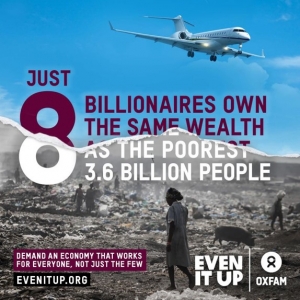Delivering regional growth through social enterprise
I was recently asked to be part of a panel session at the GuildHE conference, which looked at how universities (and other institutions) can deliver regional social and economic growth.
 For me, behind the fundamental issue of delivering social and economic growth, is the question ‘for whom and why’? Given that the world’s richest 1% now own 82% of the world’s wealth – we have patently been failing to create a more equal society, with many people left behind on low wages that have not kept up with increasing living costs. We know that more inequal societies lead to political instability, shorter lives for both rich and poor, as well as more corruption and crime.
For me, behind the fundamental issue of delivering social and economic growth, is the question ‘for whom and why’? Given that the world’s richest 1% now own 82% of the world’s wealth – we have patently been failing to create a more equal society, with many people left behind on low wages that have not kept up with increasing living costs. We know that more inequal societies lead to political instability, shorter lives for both rich and poor, as well as more corruption and crime.
So how can we change tack and look at alternatives to create a more equal society that has a stake in economic growth and addresses the needs of the locality? Social enterprises are part of the answer – these are businesses that focus primarily on the needs of their stakeholders rather than profits for shareholders.
“So what about the future? How do we move to a more sustainable society and economy? The strait-jacket view of how businesses operate must change.”
However, businesses such as the Big Issue, with their ‘hand up’ rather than ‘hand out’ approach, although helping people get back on their feet, do not tackle the root cause of homelessness. There are social enterprises that aim to do this, but I would argue that it requires a more fundamental change in thinking by society and government as a whole about the social impact of all our activities and policies. The recent UN report on poverty in the UK illustrates this, showing the shocking results of policies and actions where this doesn’t happen; effects that impact the most vulnerable – the poor, women, ethnic minorities, children, asylum seekers, single parents and those with disabilities.
I am often asked how can we measure ‘social impact’ and ‘value’? Is there a magic formula that has eluded us all this time? After many years of trying and failing to find academic answers and time consuming and expensive methodologies, there has been an admission that statistics only show us a narrow interpretation and the human stories that back up the statistics are often more important. I will never forget Nigel Kershaw, Chair of The Big Issue saying “If we’d had to evidence our social impact the Big Issue would never have got off the ground.”
All the social enterprises that apply for our accreditation are required to state how they create social value alongside showing their essential business credentials. This sometimes involves statistics but often it’s simply describing and proving how they have made a difference to and with their stakeholders.
“This is a challenge facing the wider social enterprise sector. Should we let the government off the hook by trying to fill in the gaps and delivering public sector resources, or should we find the niches where we can add value by nature of our strengths and focus?”
A number of universities are now actively demonstrating their social value through accreditation with the Social Enterprise Mark/Gold Mark. We believe that enabling social, economic and cultural prosperity lies at the heart of what makes a university good at what it does, and through our HEI network we are interrogating various aspects of this conundrum. Universities, of course, are themselves wealth creators and important employers, investing money in the local and regional economy and with their capacity, skills and resources, they can reach parts that others can’t.
There is a huge range of good practice – for example York St John’s work in mental health and business development, Solent’s work with the Maritime sector, Plymouth College of Art’s placed based industrial strategy including the creative arts school in the most deprived area of Plymouth, and Winchester’s work with supporting regional suppliers and local community asset development. I could go on!
This positioning does present some challenges though, especially in the light of austerity, declining resources at the national and regional level, as well as current uncertainties around the effects of the impending Brexit.
 In Northampton for example, the VC of the University recently contributed to a Guardian article about the role that the university could play, in acting as the glue in the absence of the bankrupt County Council. The university is dedicated to creating social impact, and supports all their students to understand the merits of social innovation and working with the local community to not only to provide direct employment, but also co-founding social enterprises. For example, Goodwill Solutions helps ex-offenders, addicts and former service personnel into employment. The university also works to support local community placements and supports the development of new social enterprises.
In Northampton for example, the VC of the University recently contributed to a Guardian article about the role that the university could play, in acting as the glue in the absence of the bankrupt County Council. The university is dedicated to creating social impact, and supports all their students to understand the merits of social innovation and working with the local community to not only to provide direct employment, but also co-founding social enterprises. For example, Goodwill Solutions helps ex-offenders, addicts and former service personnel into employment. The university also works to support local community placements and supports the development of new social enterprises.
We need to be careful though, about displacement- it cannot completely take over the role of the Local Authority. As the state shrinks we could see universities’ resources being used to fill the gaps left by the withdrawal of the public sector. Where do responsibilities start and finish given the more challenging funding environment that some universities themselves are experiencing?
“It is not just about ‘a bit of CSR around the edges’ but about a more fundamental change where the stakeholders are given the same attention as the shareholders, and where the government considers ‘social value for money’ a crucial part of delivery of services.”
This is a challenge facing not only universities but also the wider social enterprise sector. Should we let the government off the hook by trying to fill in the gaps and delivering public sector resources or should we find the niches where we can add value by nature of our strengths and focus? The balance between economic and social issues always requires interpretation of where we can work best and how we can work with others most effectively to leverage scarce resources and bring in other partners, such as local social enterprises, businesses and the public sector.
So what about the future? How do we move to a more sustainable society and economy? The strait-jacket view of how businesses operate must change. We need to look back at history to a time where businesses had a key role in their local and regional economy as part of their mission. It is not just about ‘a bit of CSR around the edges’ but about a more fundamental change where the stakeholders are given the same attention as the shareholders, and where the government considers ‘social value for money’ a crucial part of delivery of services with an equal weight and understanding to interpreting pure outputs and crude number crunching.
I believe we have a long way to go with this. In many ways we have taken steps backwards over the last few decades. I’m ever the optimist though and speaking to students and young people at recent events there has never been a clearer message that they don’t just want to make money – they want to make a difference. So perhaps there is hope for the future…





